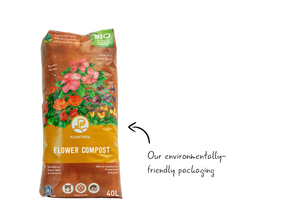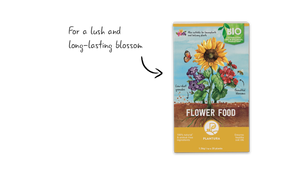Shop closed until further notice
Thank you for your support and understanding. We look forward to serving you again in the future!
Organic Flower Compost, 40L
- Regular price
- Sale price
- Regular price
- Sale price
- In Set
- Single
Incl. VAT; free shipping on orders over £39
Frequently bought together
Flower Food, 1.5kg
- Regular price
- £12.99
Starting at
Currently unavailable
Incl. VAT; free shipping on orders over £39
Liquid Flower Food, 800ml
Rated 5.0 out of 5 stars
1
- Regular price
- £10.99
Starting at
Currently unavailable
Incl. VAT; free shipping on orders over £39
Organic All Purpose Compost, 40L
Rated 4.8 out of 5 stars
12
- Regular price
- £16.99
Starting at
Currently unavailable
Incl. VAT; free shipping on orders over £39
Rose Food, 1.5kg
Rated 5.0 out of 5 stars
1
- Regular price
- £12.99
Starting at
Currently unavailable
Incl. VAT; free shipping on orders over £39

What is our compost for flowers made of?
Our organic potting soil is 100% peat-free and made exclusively from natural ingredients. For this reason, we can save up to 60% CO2 in the production of our flower soil (in comparison to conventional composts containing peat). Our compost is certified with the ECOCERT label and is composed of high-quality green compost, coir pith, wood fibres, expanded clay, calcium and magnesium fertilisers as well as some animal-free plant food.

What is the packaging made of?
Sustainable packaging is important to us - we at Plantura consider plastic to be a valuable resource and are conscious of how we use and recycle it. This is why our compost bags are made of 80% recycled plastic, an environmentally-friendly alternative to conventional packaging that is certified with the Blue Angel (German ecolabel). Please recycle your compost bags when they are empty.

For a lush and long-lasting blossom: when should I start feeding my flowers?
Only well-nourished plants display their lush and healthy blossoms. Plantura Organic Flower Compost contains fertiliser which provides the perfect base for your flowering plants. To replenish the plants’ nutrient supply (about 2 months later) we recommend using our Plantura Flower Food. This granular fertiliser is especially good for flower beds. For potted flowers, our Liquid Flower Food is the best option.
Why Plantura
We are a growing company based in Munich committed to bringing you effective and sustainable products. We stand for:













